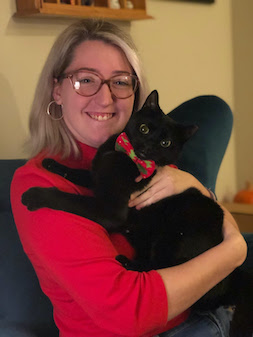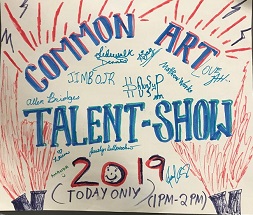Last week after Common Art, I found myself remarking in a rather ironic statement to my supervisor, the Rev. Pam Werntz, that all the action at Common Art takes place on the stage. In the back of the room is a large stage that some folks opt to sit or lie down on. I’ve noticed over the last few weeks that this tends to be a hotspot for any commotion or behavior that may need some checking in with. This was the case this past week as some tensions arose near the stage a few times throughout the day.
Musings from the Margins
Setting Boundaries

Isabelle Olsson
In addition to working with Common Art, as a part of my internship I am also spending some time at the Black Seed Writer’s Group offered as a part of MANNA at St. Paul’s Cathedral. This has been such a wonderful opportunity to continue to work with many of the same community members in a different space, through their writing I get to see a different side of their creativity that often compliments their artwork. This past week, as I left the Black Seed Writer’s Group I found myself a bit stuck on the concept of negotiating boundaries. I had a few small moments throughout the day that tested my boundaries as a new member of the community and had me reflecting on what boundaries should look like. In some ways, I felt like I had foundered in a few moments where I could have set firmer boundaries. Continue reading
Engaging with the Community

Isabelle Olsson
In the last few weeks, as crisp breezes have brought way to the bright colors of falling leaves there has been a lot of change in the air especially at Common Art. While group members have continued to adjust to the altered art materials and structure due to pandemic related protocol, Common Art has also been blessed with wonderful changes including new staffing and interns! Nevertheless, with all these changes afoot I have noticed a lot of anxiety amongst group members especially about the upcoming winter and presidential election. After all, change can be quite difficult and, as a group, they have experienced quite a lot of trauma. All of these changes left me feeling inspired when it came time to bring my first activity to the group. Finding my theme in the many changing leaves I began to see each morning I came up with the idea of doing leaf rubbings with group members using various leaves I collected and colored pencils. My hope was that in creating beautiful prints of the leaves we could all take a moment to enjoy the meditative process of rubbing the leaves and appreciate the beauty in this part of something that is a change…and of course to tap into some of the group’s noticeable fall festivity!
Welcome, Isabelle!

Isabelle Olsson
This year I join Emmanuel Church as an intern from Lesley University’s Master of Arts in Mental Health Counseling with a specialization in Art Therapy. As a second-year student, I have been eager to begin working in the community connecting with others.
Good Enough
Awkward Conversations
Looking into Hesitancy
And we’re back!
Crisis Intervention
Talent Show
 Two weeks ago, I wrote about my “silliness” skill and my ability to make others feel comfortable being goofballs. Then I spoke to a friend of mine who also has this skill. From her perspective, the skill isn’t just about making others feel comfortable being playful, but also about making others feel more comfortable about their insecurities. She explained that when we heighten and exaggerate our own insecurities, bringing them to a “ten,” the insecurities become a lot less intimidating and a lot more ridiculous, evoking more laughter and less anxiety. For example, I tend to be a perfectionist, a behavior rooted in my insecurity of not being good enough. When I notice I’m feeling perfectionistic, I exaggerate the statement—“If I don’t have straight A’s, I’m not trying hard enough” becomes “I MUST score an ‘A’ on EVERY assignment or else I don’t deserve to be in school at all!” This statement is accompanied by a deep, scratchy, commanding voice and dramatic, clutching hand gestures. With this insecurity externalized and heightened, I’m able to see what parts of it are ridiculous and illogical; I can see how these perfectionistic thoughts, which are so natural and constant in my mind, don’t actually serve me. It was empowering for me to recognize that my “silliness” skill has broader implications than I thought. It’s not only about helping others feel comfortable being playful; it’s also about helping others feel comfortable and safe enough to confront their insecurities, hopefully to then view them with a fresh and less anxious perspective.
Two weeks ago, I wrote about my “silliness” skill and my ability to make others feel comfortable being goofballs. Then I spoke to a friend of mine who also has this skill. From her perspective, the skill isn’t just about making others feel comfortable being playful, but also about making others feel more comfortable about their insecurities. She explained that when we heighten and exaggerate our own insecurities, bringing them to a “ten,” the insecurities become a lot less intimidating and a lot more ridiculous, evoking more laughter and less anxiety. For example, I tend to be a perfectionist, a behavior rooted in my insecurity of not being good enough. When I notice I’m feeling perfectionistic, I exaggerate the statement—“If I don’t have straight A’s, I’m not trying hard enough” becomes “I MUST score an ‘A’ on EVERY assignment or else I don’t deserve to be in school at all!” This statement is accompanied by a deep, scratchy, commanding voice and dramatic, clutching hand gestures. With this insecurity externalized and heightened, I’m able to see what parts of it are ridiculous and illogical; I can see how these perfectionistic thoughts, which are so natural and constant in my mind, don’t actually serve me. It was empowering for me to recognize that my “silliness” skill has broader implications than I thought. It’s not only about helping others feel comfortable being playful; it’s also about helping others feel comfortable and safe enough to confront their insecurities, hopefully to then view them with a fresh and less anxious perspective.
